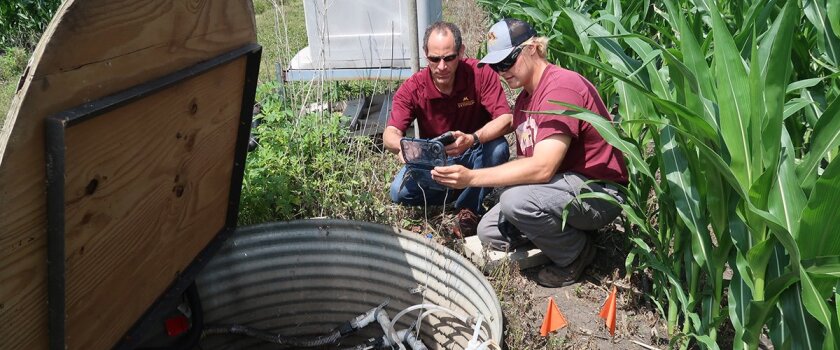MANKATO, Minn. — George Rehm's obituary reads how as an extension specialist in nutrient management, he believed his job was to help farmers, and if the scientific community was affected, so be it.
Rehm, who worked at the University of Nebraska as an extension agronomist for 14 years before he returned to the University of Minnesota in 1983 as an extension specialist in nutrient management, died at the age 82 in January.
ADVERTISEMENT

Rehm left behind a legacy of general goodwill between farmer and scientist, as well as a foundation he helped build for coordinated nutrient management research in the state.
That was on display at the University of Minnesota's Nutrient Management Conference, held in Mankato on Feb. 20. The annual event brings together soil scientists and educators from Minnesota and neighboring states to share their research and recommendations. This year’s topics included nutrient bioavailability, agricultural biologicals, effective nutrient management with cover crops and of course, George Rehm.
"We've been putting this event on now for 16 years," said Warren Formo, executive director of Minnesota Agricultural Water Resource Center. "Prior to Fabian (Fernandez, a nutrient management specialist at the University of Minnesota Extension), George Rehm was the main planner of this conference."
The coordinates and plans the event, along with the annual Nitrogen Management Conference, while University of Minnesota Extension does agenda development.
Formo met Rehm in early 2009 when the center was looking for a coordinator for its Discovery Farms program. They needed someone not afraid to get out and meet farmers, and he'd heard stories of Rehm for many years from his soil fertility outreach role at the University of Minnesota, which he had then recently retired from.
"He knew Minnesota farmers and the soils and the cropping systems so well," Formo said.
Formo said that Rehm's scientific mind was sharp when it came to the "nuts and bolts of soil, water and nutrients," and that he had the heart of an educator.
ADVERTISEMENT
"He understood things so well, but he wanted to help people understand it," Formo said. "As a PhD, a super smart guy, he didn't come across that way when he was just chatting."
If Formo needed a piece of information relative to soils, chemistry and nutrients, he called Rehm, who was persistent when it came to healthy debates among colleagues.
"Obviously the research is moving forward and it keeps getting more complicated as these researchers here continue to discover, but George would have been sitting in here listening, and challenging Daniel Kaiser on phosphorus," Formo said with a laugh. "They wouldn't butt heads, but they'd kind of go back and forth, and both gets smarter because of it."
Rehm retired from the Minnesota Agricultural Water Resource Center in 2019, after leaving his mark on the organization and coordinated research altogether.
Formo credits Rehm for championing the Agricultural Fertilizer Research and Education Council, after he identified a need for soil fertility research in Minnesota but without a steady funding source.
"If it wouldn't have been for him, we probably wouldn't have it, quite frankly," Formo said of Rehm and the council.
Rehm himself had no issue with raising money for his research projects, but younger researchers without such history were often stifled by lack of funding for nutrient management, Formo said.
ADVERTISEMENT
"George saw AFREC as a dedicated million dollars a year, that's competitive and that you have to apply for, but at least it's a pool of money that they're going to get funded for good projects," Formo said. "Now, you look at all the researchers who have come on board in Minnesota in the last 15 years, and they will all tell you how helpful it's been to have this funding."
nutrient management specialist at the University of Minnesota Extension, was one of those young researchers who met Rehm over 20 years ago while doing his undergraduate work. The two eventually became colleagues and partnered on efforts to hold the annual conferences.
Fernandez said Rehm had an "important influence" on the work he's done and is doing today.
"He was an icon of soil fertility across the U.S. and the Midwest, and certainly here in Minnesota," Fernandez said. "And a person that I would always look up when I went to national conferences for soil fertility, so I could go listen to his talks and learn about what he was doing."

Fernandez said nutrient management research wouldn't be where it is today in Minnesota without the funding that Rehm pushed for through the Agricultural Fertilizer Research and Education Council, and his decades of outreach and coordination.
Fernandez said what made George Rehm special was his dedication.
"He was very dedicated to soil fertility and to the work that he did at the university. And I think he cared a lot for people. He cared for the farmers, and so they were his priority, and I think that shows," Fernandez said. "Everybody knows George in Minnesota, because he was out there always, doing research and sharing the information with farmers. Ultimately, he was very interested in making sure that the information that he gained through research in the lab was in the hands of those that will have the most benefit out of it, which is farmers and the agriculture industry."
ADVERTISEMENT
Read









